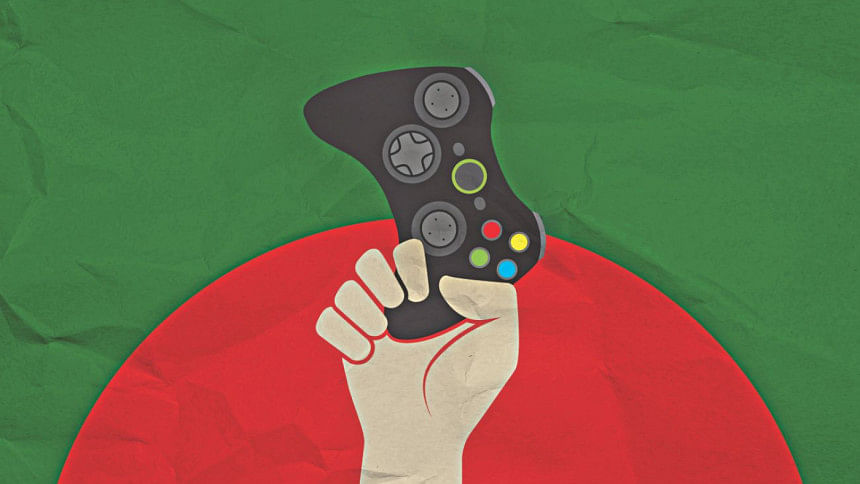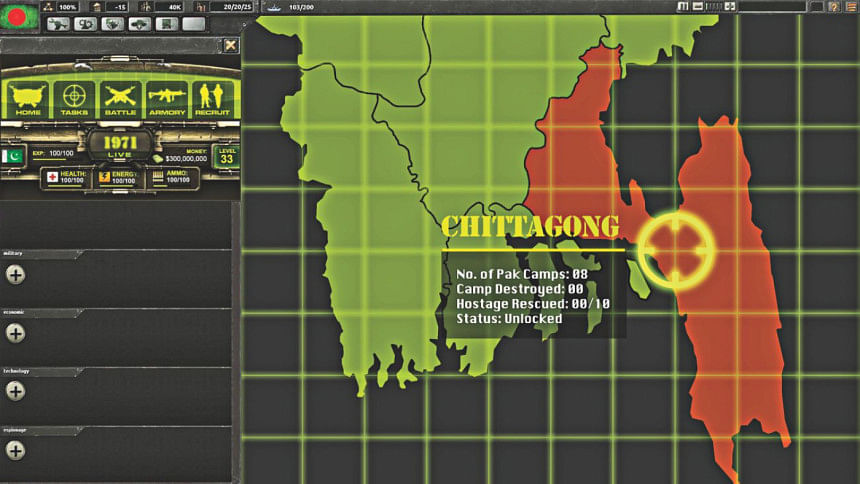GAMES INSPIRED BY HISTORY

None of these ideas are Assassin's Creed.
Building Bangladesh
Setting: Post-war Bangladesh
Genre: Management Simulator
Plays like: Rollercoaster Tycoon meets Tropico, but serious.
So the war just ended and it hasn't been exactly kind to the country. You have blown-up bridges, sunken boats clogging up rivers, loads of destroyed buildings and ghost towns. As a nameless project manager, your job will be to pick up the pieces and restore normalcy.
You get your monthly budget, supply and manpower allocations and you put them to work. Rebuild that burnt village, give the children their school again, maybe use your budget to offer the farmers free seeds for their fields (which you cleared of busted vehicles and mortar shells.) People start moving back in and you have local labour to recruit now. You win the mission after enough people move back in, or perhaps you go for bigger challenges (e.g. the village attaining a certain monthly value of goods produced or attaining a high enough birth rate.) Then the next mission could have a darker tone where you try rebuilding a bridge, and have to work with the challenges of water flow and congestion, clearing out the kochuripana and corpses while trying to keep your workforce healthy. And then you have the yearly floods.
Every map would offer unique challenges, and each type of construction project would have you worry about different elements, natural or man-made. Maybe some of the discarded shells in the field are still live. And no Bangladeshi management sim can avoid the very locals you're helping getting in your way. The game would be an interesting mix of the relaxing, constructive appeal in SimCity or the Tycoon games, with the lazy larceny and threats to your rule from Tropico (AKA Banana Republic Simulator.)

Amar Ei Desh
Setting: Liberation War
Genre: Walking Simulator
Plays like: Telltale Games' The Walking Dead, This War of Mine
Not every war story needs to be about soldiers, and not every game needs to be 'fun'. This War of Mine was a widely-played title that places you in charge of a group of civilians trying to survive an anonymous war, whatever the cost. The Walking Dead deals with similar themes, charting the travels of a few characters through a hostile world, incorporating choices with permanent, unforeseeable repercussions.
Combine these two games, add a healthy dose of ambition, and set it during the Liberation War. An instant classic, and a milestone for Bangladeshi culture.
Start right from Operation Searchlight as a middle-aged man whose family is lost in the crackdown on Dhaka. You are a mildly famous intellectual and nationalist and so are in constant danger from the jawans. Escape the city with whatever supplies you can scrounge up, or perhaps make a desperate attempt at rescuing anyone who might have survived in your household. Don't rest idle, always keep moving, taking care of your health as well as you can, sleeping in village beds, cheap hotels, forests and fields. Make companions along the way, any of whom might betray you or murder you in your sleep. Watch what you say to people, you never know what conversation might come back to haunt you down the line.
Listen for rumours and the news from strangers you meet on the way, and decide whether to believe them that the village ahead is safe or if it isn't crawling with razakars by now. Newspapers and radio are Pakistani propaganda, how much can you trust them? Shadhin Bangla Betar Kendro, if you dare to listen to it, will offer you the real deal and music that'll cheer up your party.
Pick up weapons and practice with them (maybe you'll meet a companion who knows and can teach you), and you can defend yourself better, and maybe become a danger in your own right. This is not a game about being a good guy, it's about staying alive. The law, human decency, even the survival of your companions, are simply optional.
NOT for children.
Paradise of Nations
Setting: Heyday of the Bengal Subah
Genre: Trading Simulator meets Grand Strategy
Plays like: Europa 1400: The Guild, Crusader Kings 2, Petyr Baelish's dreams
Bengal's always been a centre of trade and commerce due to its geographical location and the Bengal Subah saw it at its zenith. The Mughal Empire ushered in an unprecedented traffic of trade and ideas from the Muslim world, coinciding with Europe's thirst for exotica. Paradise of Nations would have you play as a merchant family of your choosing, with a variety of historical starting points that will affect gameplay, and a selection of possible bases of operation: ranging from Sylhet with its tea and position on the Southwestern Silk Road, to the newly-conquered Chittagong and the wealth of the sea, and you could even start your game from Calcutta and try to build up your merchant empire under the thumb of the fast-expanding British.
Manage your relations with the local lords, perhaps usurping their authority if you put your mind to it. Compete with other merchant families the old-fashioned way by offering your customers better deals and beating them to fresh opportunities; or deal with them in the really old-fashioned way by hiring mercenary. And what trading game would be complete without foreigners?
Make relations with those old India hands, the Portuguese, and the British and French while they're still fresh off the boat. Haggle with the Arabs and the Turks and the Persians, the Tibetans, the Burmese and the Chinese, to say nothing of the Arakan Kingdom up Chittagong way. Those you trade with will gain power and influence in Bengal and you'll need to make sure you grow with them, lest they sweep past you. As the years and decades go by and your family prospers through the generations you will see your actions affect the politics and fortunes of the region. Maybe your actions will stop the British ever gaining a foothold in the country. Maybe you'll keep the Mughal Empire running with your funds. Maybe you'll use your money to sponsor regime change to suit your needs.
Sector 71
Setting: Liberation War
Genre: Turn-Based Tactics
Plays like: XCOM 2, Commandos
Shooting droves of jawans in the face has its appeal, but if you want to create a real feel for a guerrilla op you have to get tactical. Play as a sector commander whose job it is to foil the Pakistani Army's moves by assigning squads of muktijoddhas to various tactical missions. The strategic deployment and base management aspects of the game will be turn-based, and the actual missions could be turn-based to allow for more calculated attacks, though Commandos showed us it's possible to do this in real-time.
Establish a network of protected villages and eventually cities, which will produce a constant stream of supplies and recruits for you. Train your recruits as soldiers with a variety of skills to choose from, or as support staff such as nurses and radio operators. You have to actively deploy your recruits to achieve everything: scout for Pakistani army movements, listen in on their radio transmissions, bring supplies from friendly villages, and coordinate with the wider resistance movement. Deploying your troops will hamper the Pakistanis' ability to target your villages, other muktijoddha groups, or even your own base if they can get a fix on it. Successfully striking against them and defending your interests will boost your troops' morale and experience, and give you a better reputation leading to more aid and material from the population and the resistance. Failed missions can lead to massacred villages, dead or captured muktijoddhas (who will be tortured for information). Support for you will plummet, and you could lose the war.
You will use the local population as your resource, and you can hide among them in certain missions, but you can't take them for granted. Moving through a village could have you ambushed by razakars, and you never know if a distress call isn't really a trap.
To prevent being caught in a feedback loop of failure, a get-out-of-jail card will exist in the form of India, with whom you can earn influence by doing missions they request and maintaining strong radio communication. Influence can be spent for bigger, badder weapons, faster training of recruits and even air strikes against particularly troublesome Pakistani positions. You can even go to ground in Meghalaya when the going gets too tough.
India will also feature in the end-game, when their corps will march into the country to finish the war. At this stage you will play a more specialist role, supporting the Indian advance with your guerrillas in big, pitched battles. The Pakistanis' capability to fight in these final battles will be determined by how well you did in your operations against them.
Some people will intentionally play badly in the early game to make this part more challenging, bless them.

 For all latest news, follow The Daily Star's Google News channel.
For all latest news, follow The Daily Star's Google News channel. 



Comments